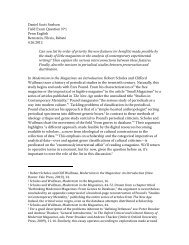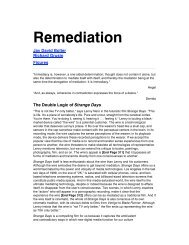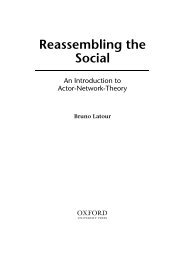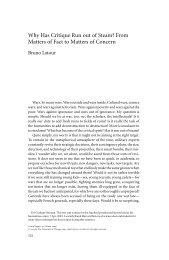The Exploit: A Theory of Networks - asounder
The Exploit: A Theory of Networks - asounder
The Exploit: A Theory of Networks - asounder
Create successful ePaper yourself
Turn your PDF publications into a flip-book with our unique Google optimized e-Paper software.
Nodes 71<br />
at which “life itself ” plays a particular role in the ongoing management<br />
<strong>of</strong> the social and the political.<br />
This is differentiated from, but not opposed to, an “anatomo -<br />
politics,” in which a range <strong>of</strong> disciplinary techniques, habits, and movements—most<br />
<strong>of</strong>ten situated within institutions such as the prison,<br />
the hospital, the military, and the school—collectively act on and<br />
render docile the individualized body <strong>of</strong> the subject. 40<br />
Contemporary interpretations <strong>of</strong> biopolitical instances vary from<br />
the medical - sociological emphasis on normativity, to the philosophical<br />
emphasis on the concept <strong>of</strong> “bare life,” to the political and existential<br />
emphasis on biopolitics as the production <strong>of</strong> the social. 41<br />
Our approach will be very specific. We want to pose the question: what<br />
does biopolitics mean today, in the context <strong>of</strong> networks, control, and protocol?<br />
If networks permeate the social fabric, and if networks bring with<br />
them novel forms <strong>of</strong> control, then it follows that an analysis <strong>of</strong> networks<br />
would have to consider them as living networks (and politics<br />
as biopolitics). <strong>The</strong>refore we can consider the biopolitics <strong>of</strong> networks<br />
by highlighting two aspects nascent within Foucault’s concept: that<br />
<strong>of</strong> biology and that <strong>of</strong> informatics.<br />
Biopolitics is, as the term implies, an intersection between notions <strong>of</strong><br />
biological life and the power relations into which those notions are stitched.<br />
Both are historical, and both are constantly undergoing changes.<br />
Foucault mentions the regulation <strong>of</strong> birth and death rates, reproduction,<br />
pathology, theories <strong>of</strong> degeneracy, health and hygiene, as well<br />
as new statistical methods <strong>of</strong> tracking the migration <strong>of</strong> peoples<br />
within and between nations, all <strong>of</strong> which emerge from the end <strong>of</strong> the<br />
eighteenth century through the late nineteenth. 42 Biopolitical forms<br />
thus exist alongside the emergence <strong>of</strong> Darwinian evolution, germ<br />
theory, social Darwinism, and early theorizations <strong>of</strong> eugenics.<br />
But biopolitics is not simply biology in the service <strong>of</strong> the state. It<br />
is created, in part, by a set <strong>of</strong> new technologies through which populations<br />
may be organized and governed. <strong>The</strong> accumulation and ordering<br />
<strong>of</strong> different types <strong>of</strong> information are thus central to biopolitics.









